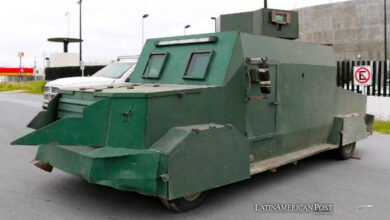As the countdown to the crucial referendum on December 3rd continues, the Venezuelan government has redoubled its efforts to mobilize its citizens for a consultation concerning the longstanding territorial dispute with neighboring Guyana.

11/24/2023.- Photo provided by the Miraflores Palace Press Office showing Venezuelan President Nicolas Maduro with his wife, First Lady Cilia Flores, during the inauguration of the Cinta Costera Paseo La Marina, in La Guaira (Venezuela). EFE/ Miraflores Press
Latin American Post Staff
Escucha este artículo
Leer en español: El llamado de Venezuela a unirse mediante referéndum sobre la disputa del Esequibo
At the heart of this matter lies a vast expanse of land, spanning nearly 160,000 square kilometers, situated to the west of the Esequibo River.
Mobilization for "Yes" Votes
Over the past weekend, government officials and members of the referendum campaign command fanned out across the nation, engaging in a range of activities designed to motivate the public to respond with an emphatic "yes" to five pivotal questions. These questions seek to secure popular endorsement for the government's actions in this protracted territorial feud.
In the nation's capital, Caracas, Mayor Carmen Meléndez took the lead in distributing informative pamphlets about the referendum and made a heartfelt plea to Venezuelans to actively join the struggle for the territory that Venezuela has long claimed as its own.
"Venezuela is calling upon us, and it is imperative that we all come together on December 3rd, heading to our respective polling stations and casting our votes in favor of the defense of our Esequibo," she passionately implored, as reported in a press release by the ruling United Socialist Party of Venezuela (PSUV).
The PSUV also underscored the success of rallies held in various regions of the country, accompanied by the mobilization of approximately 237 social movements and community organizations in the western state of Mérida. These groups have undertaken "door-to-door" informational campaigns, spreading awareness and galvanizing support for the upcoming referendum.
President Maduro's Social Media Campaign
President Nicolás Maduro, for his part, harnessed the power of social media to share informative videos outlining Venezuela's compelling arguments in this territorial dispute. He used this platform to call upon citizens to unite in solidarity.
"With just seven days remaining until the people demonstrate their commitment to democracy and peace in the consultative referendum for the defense of our Guayana Esequiba, we are witnessing a growing sense of unity, solidarity, and mutual respect among Venezuelans," President Maduro asserted in a message posted on his X (formerly Twitter) account.
Last week, the National Electoral Council (CNE) provided an update on the progress of preparations for the upcoming referendum, reporting that 75% of the scheduled activities had already been completed. The remaining 25% of tasks were set to commence over the weekend, ensuring that all necessary measures are in place for a smooth and efficient referendum process.
Significance of the Referendum
A total of 20,694,124 eligible voters stand ready to participate in the non-binding referendum, which, while not legally binding, serves as a vital platform for citizens to express their endorsement or rejection of the government's stance on this critical territorial matter.
The Esequibo territorial dispute between Venezuela and Guyana has deep historical roots, stretching back for centuries. It centers on the ownership of a vast and resource-rich expanse of land known as the Essequibo region, which encompasses significant oil reserves. The dispute has been a source of tension and conflict in the region for generations.
Venezuela has consistently asserted its claim to the Essequibo region, citing historical evidence and international treaties to support its position. However, Guyana maintains that the region is rightfully its own, emphasizing the need for a peaceful and legal resolution to the dispute.
The upcoming referendum, despite being non-binding, carries immense symbolic weight. It represents a critical opportunity for Venezuelans to voice their support for their government's stance and send a strong message to the international community about the importance of the Esequibo territory.
Geopolitical Impact
While the outcome of the referendum will not have direct legal ramifications, it can significantly impact the diplomatic and geopolitical dynamics surrounding the dispute. A resounding "yes" vote would bolster Venezuela's position and potentially influence future negotiations and diplomatic efforts aimed at resolving the dispute peacefully.
Also read: Colombian President's Bold Proposes Bonuses for Venezuelan Migrants
The mobilization efforts witnessed over the weekend signal the significance of this moment for Venezuela. It is a time when the nation seeks to stand united and make its voice heard on an issue of immense national and historical importance. The referendum is not merely a vote; it is a declaration of solidarity and resolve in the face of a complex and long-standing challenge.
As the countdown to December 3rd continues, Venezuela awaits the outcome of this referendum with bated breath. It is a moment that will not only shape the nation's stance on the Esequibo dispute but also serve as a testament to its commitment to the principles of democracy, peace, and sovereignty. Regardless of the ultimate result, the referendum represents a significant chapter in Venezuela's ongoing quest for resolution and recognition on the international stage.





